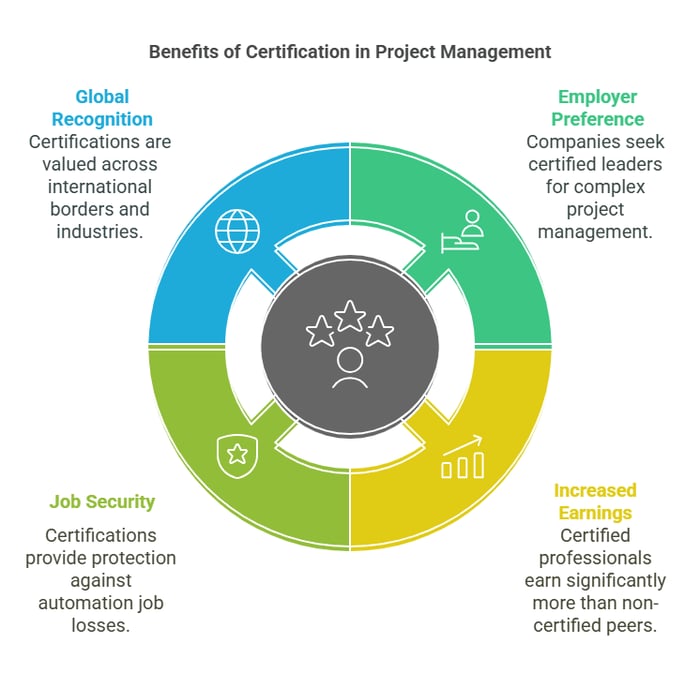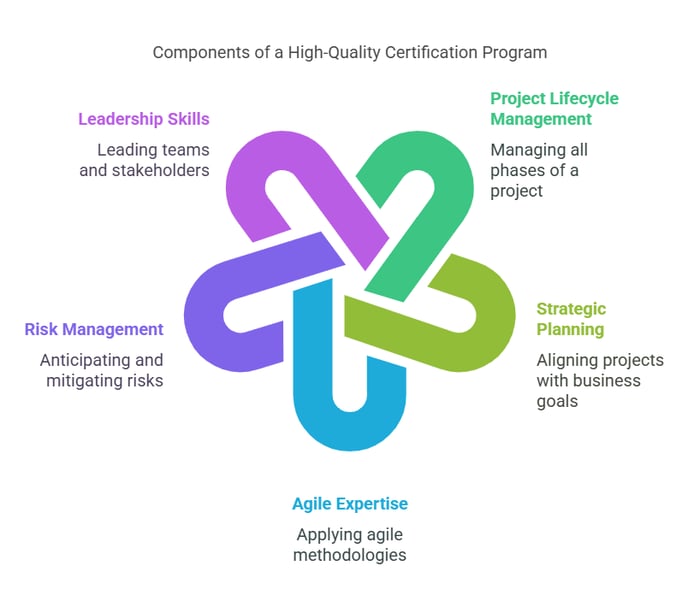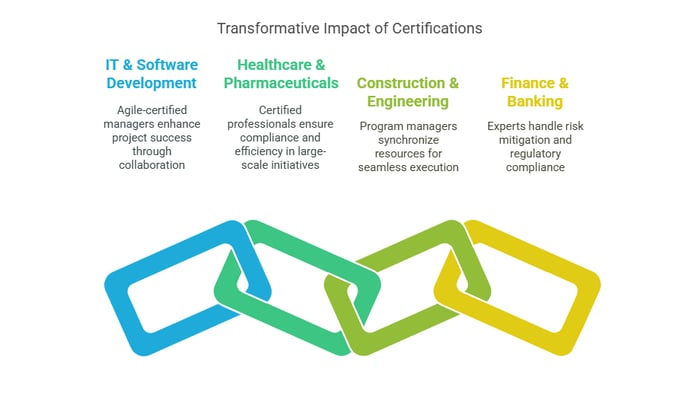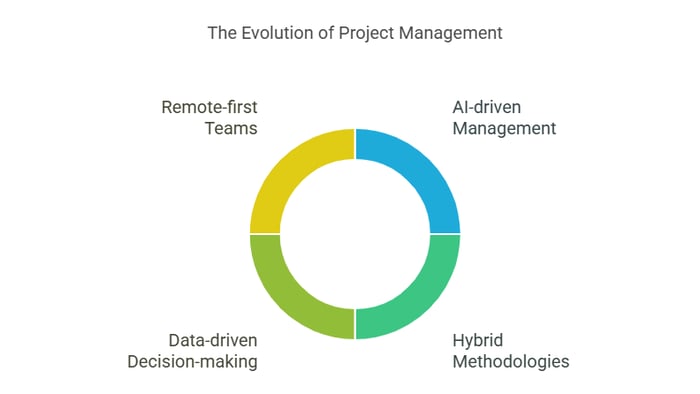Table of Contents
- Why Managing Projects Without Certification is Like Cooking Without a Recipe?
- What is a Program and Project Management Certification?
- Why is a Program and Project Management Certification More Relevant Than Ever in 2025?
- The Difference Between Project and Program Management
- Core Components of a High-Quality Certification Program
- Real-World Applications: How This Certification Transforms Careers
- Why Choose APMIC’s Certification?
- How to Choose the Right Program and Project Management Certification?
- Common Mistakes to Avoid When Managing Large Programs
- Industry-Specific Applications of Program and Project Management Certification
- The Future of Program and Project Management
- 10 Less Commonly Known Facts About Program and Project Management
- Final Thoughts
- FAQs
Why Managing Projects Without Certification is Like Cooking Without a Recipe?
Imagine trying to bake a five-tier wedding cake without a recipe. You might get lucky, but chances are you'll end up with a mess. Managing complex projects without the right certification is just as risky. Whether you're juggling multiple deadlines, leading diverse teams, or handling high-stakes budgets, a Program and Project Management Certification is your ultimate cheat code to success.
Want to level up your career, boost your earning potential, and become the go-to leader in your field? Stick around—we’re diving deep into why this certification is a game-changer in 2025 and beyond!

What is a Program and Project Management Certification?
A Program and Project Management Certification is a professional credential that arms you with the knowledge, frameworks, and tools to manage both individual projects and large-scale programs effectively. These certifications go beyond traditional project management by covering:
Advanced program coordination
Strategic leadership
Risk mitigation
Agile and Scrum methodologies
Whether you’re overseeing a single project or orchestrating an entire program, this certification ensures you stay ahead of challenges and deliver impactful results.
Why is a Program and Project Management Certification More Relevant Than Ever in 2025?
The project management landscape is evolving at warp speed. With AI-driven workflows, remote teams, and cross-functional projects becoming the norm, certified professionals are more in demand than ever. Here’s why:

Companies Prioritize Certified Leaders: Employers want proven leaders who can handle complex projects without costly mistakes.
Higher Earning Potential: Certified professionals earn 20-25% more than non-certified counterparts (source: PMI Salary Survey).
Job Security: With automation on the rise, certifications future-proof your career by proving your expertise.
Global Recognition: Many certifications align with international standards, making them valuable across industries and borders.
The Difference Between Project and Program Management
Before diving into the benefits, let’s clear up a common confusion:
Project Management: Focuses on a single initiative with a defined scope, timeline, and budget.
Program Management: Involves managing multiple interconnected projects to achieve a larger strategic goal.
Think of project management as producing a blockbuster movie, while program management is overseeing an entire film franchise like Marvel’s cinematic universe.
Core Components of a High-Quality Certification Program
A strong Program and Project Management Certification covers a variety of critical skills, including:

1. Mastering the Project Lifecycle
From initiation to closure, certified professionals learn how to manage all project phases, ensuring efficiency and success.
2. Strategic Program Planning
Effective program management involves aligning multiple projects with business objectives while balancing resources and stakeholder expectations.
3. Agile and Scrum Expertise
The future of project management is Agile. Certifications teach you how to apply Scrum, Kanban, and other agile methodologies to streamline workflows.
4. Risk Management & Problem Solving
A good certification equips you with risk assessment tools to anticipate issues before they derail a project.
5. Stakeholder and Team Leadership
Effective communication and leadership strategies are essential for managing diverse teams and complex programs.
Real-World Applications: How This Certification Transforms Careers

IT & Software Development
Agile-certified project managers increase project success rates by ensuring seamless collaboration and delivery in software teams.
Healthcare & Pharmaceuticals
Certified professionals streamline large-scale initiatives like hospital expansions and drug development programs, ensuring compliance and efficiency.
Construction & Engineering
From skyscrapers to infrastructure, program managers synchronize contractors, suppliers, and budgets for seamless execution.
Finance & Banking
Risk mitigation and compliance projects demand experts who can handle high-stakes decision-making and regulatory requirements.
Additional Resource: The official Project Management Body of Knowledge PMBOK guide by PMI, an essential resource for project managers pursuing certification
Why Choose APMIC’s Certification?
Among the many certification programs available, APMIC’s Project Management Certification sets the gold standard. With 400+ modules, real-world case studies, and a globally recognized credential, it prepares you for leadership roles across industries.
How to Choose the Right Program and Project Management Certification?
Not all certifications are created equal! Here’s a quick guide to picking the right one:
| Certification | Best For | Cost | Recognition | Difficulty Level |
|---|---|---|---|---|
| APMIC | All industries | Affordable | High | Moderate |
| PMP | Traditional PM roles | High | Very High | Hard |
| PgMP | Large-scale programs | Very High | High | Extremely Hard |
| PRINCE2 | UK/EU markets | Moderate | High | Moderate |
Factors to Consider:
- Your Career Goals: Are you managing single projects or full-scale programs?
- Industry Demand: Some industries prefer PMP, while others value PRINCE2 or APMIC.
- Budget & ROI: Higher-cost certifications don’t always mean higher returns.
💡 Pro Tip: A recognized certification like APMIC balances affordability, depth, and career impact!
Common Mistakes to Avoid When Managing Large Programs
Even certified project managers make mistakes. Here are some of the biggest pitfalls:
🚨 1. Scope Creep = Project Disaster
- Letting stakeholders add features mid-project = missed deadlines.
- Solution: Use a change control process.
🚨 2. Ignoring Risk Management
- Not planning for risks = unexpected delays & cost overruns.
- Solution: Use risk matrices & mitigation plans from certification courses.
🚨 3. Poor Stakeholder Communication
- Failing to update stakeholders = loss of trust.
- Solution: Certified managers master communication frameworks to keep everyone aligned.
Industry-Specific Applications of Program and Project Management Certification
Wondering how certifications translate into real jobs? Let’s break it down:
🏗️ Construction
- Managing multimillion-dollar builds with scheduling and risk mitigation.
- Example: A certified PM cut waste by 20% in a major highway expansion project.
💻 IT & Software
- Handling Agile sprints & ensuring on-time software releases.
- Example: A PMP-certified PM reduced bug rates by 35% through structured risk assessment.
- Looking to advance in the tech sector? Discover the best IT project management certification options to stay ahead in 2025.
🏥 Healthcare
- Overseeing hospital IT rollouts & medical research projects.
- Example: A certified PM delivered a hospital digital transformation project 3 months early.
- If you're in the healthcare industry, earning a project management certification in healthcare can give you a competitive edge in managing complex medical projects.
Each industry has its own unique needs, and a recognized certification helps you adapt.
The Future of Program and Project Management
Project and program management are evolving at warp speed, and if you think traditional methodologies are enough, think again! 🚀

By 2025 and beyond, companies are shifting toward:
- AI-driven project management – AI tools are already automating risk assessment, resource allocation, and task prioritization.
- Hybrid methodologies – No more “one-size-fits-all.” Agile, Waterfall, and Lean are blending to form custom project management frameworks.
- Data-driven decision-making – Certified professionals are expected to use real-time analytics for forecasting and stakeholder reporting.
- Remote-first project teams – With globalization, virtual project management skills are becoming essential.
Getting certified now ensures you stay ahead in this fast-moving field, future-proofing your career for decades to come. If you're new to the field, choosing the best entry-level project management certification can set a strong foundation for your career.
10 Less Commonly Known Facts About Program and Project Management
Project managers spend 90% of their time on communication (PMI)
Poor project management costs businesses $122M for every $1B invested (HBR)
The first known project manager was from ancient Egypt (History)
90% of Agile teams outperform traditional teams (Scrum)
60% of project failures are due to poor leadership (Gartner)
70% of organizations use Agile methodologies (Agile)
AI is expected to automate 80% of project management tasks by 2030 (Forbes)
Women hold only 30% of project management leadership roles.
Only 35% of projects are completed on time and budget (McKinsey)
Stakeholder engagement increases project success by 64%.
Final Thoughts
A Program and Project Management Certification isn’t just another credential—it’s the key to unlocking your leadership potential. Whether you’re managing software launches, hospital expansions, or global finance initiatives, the right certification prepares you for real-world success.
Looking for the best program to get started? APMIC’s Project Management Certification offers cutting-edge training designed for future leaders like you. Don’t wait—invest in your career today!
FAQs
Is program management harder than project management?
Yes, because it requires overseeing multiple projects, aligning strategic goals, and managing interdependencies.
How long does it take to get certified?
Most programs take between 8 weeks to 6 months, depending on your chosen learning pace.
Do certifications guarantee a salary increase?
While not guaranteed, research shows certified professionals earn 20-25% more than non-certified counterparts.
Can I get certified without project management experience?
Absolutely! Many entry-level certifications provide foundational knowledge suitable for beginners.
What’s the best certification for Agile project management?
Certifications like Certified ScrumMaster (CSM) or PMI Agile Certified Practitioner (PMI-ACP) are top choices.
Can I complete a certification while working full-time?
Yes! Many programs, including APMIC, offer self-paced and online learning options for working professionals.
Do certifications expire?
Some require renewal (e.g., PMP every three years), while others are lifetime certifications.
What industries benefit most from certification?
IT, healthcare, finance, construction, and engineering are top industries where certifications have the highest impact.





